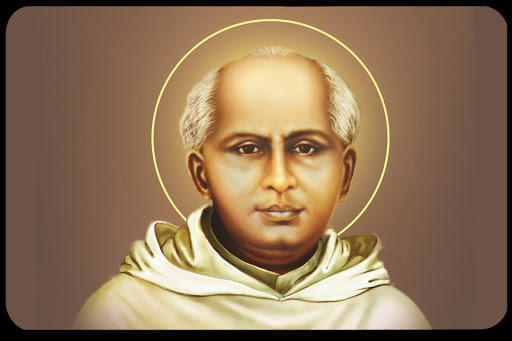Mannanam, India – Canonization may be a practice exclusive to Catholics and Orthodox. But when Pope Francis raised two Indians to the altars Sunday, the celebrations were not confined to Christians.
Indeed, in spite of growing tensions between Hindu nationalists and Christians in India, many Hindus joined in celebrations in predominantly Christian areas of the subcontinent while Pope Francis conducted the canonization rites in Rome on the feast of Christ the King.
Father Kuriakose Elias Chavara, a priest from the Indian state of Kerala, was canonized along with Sister Euphrasia Eluvathingal, who belonged to the Congregation of the Mother Carmel, founded by St. Chavara. Pope Francis also canonized Italians Giovanni Antonio Fraina, Ludovico da Casoria, Nicola da Longobardi and Amato Ronconi.
Father Chavara, a priest of the Syro Malabar Church, which traces its lineage to St Thomas the Apostle, worked for Indians across religious and caste divides, and many non-Christians today say they are in his debt for the work he did. As Kerela’s chief minister Oommen Chandy, an Orthodox Christian, put it, the priest "is not the exclusive heritage of a denomination or a community. He belongs to the whole Kerala.”
Chandy led a delegation of Kerala’s political leaders, including Hindu ministers in his cabinet, to a Mass Sunday at St. Chavara’s shrine at Mannanam. The Mass drew about 100,000 people.
Father Chavara founded St. Joseph’s monastery on top of Mannanam hill in 1831 and spent 33 years there. His body was moved here in 1889, and the place has been one of the most popular pilgrimage sites in Kerala for decades.
“Father Chavara was a revolutionary both in spiritual matters and in social action. He paved the way for the social transformation and educational progress of our state,” Chandy acknowledged.
Kerala’s progress in the field of education is rooted in the “outcome of Father Chavara’s order” that each church should have a school to educate the low castes who were not allowed to enter schools at the time, Chandy said.
Kerala is the largest Christian pocket in India with nearly 7 million Christians among its 35 million people. It is also the most literate and educationally advanced in India. The Church there runs nearly half of the 15,000 private primary schools.
“Father Chavara pioneered many social service initiatives like education of the weaker sections, free lunch for the poor, and empowerment of women,” noted Ramesh Chennithala, a Hindu and Kerala’s home minister. “The government is only following some of the examples Father Chavara showed us,” he added.
Thirvanjur Radhakrishan, another Hindu minister in the Kerala government, hailed St. Chavara as a “friend of the poor.”
Earlier, Bishop Mathew Arackal of the Syro-Malabar Eparchy of Kanjirappilly spoke of the “unique legacy” of Chavara, who “went around begging for money to provide lunch to hungry students” from lower castes.
He pointed out that the priest opened the first Sanskrit school in 1846 (at the monastery compound) at a time when lower castes were punished for studying the language of the priestly Brahmin class.
“It was a bold step for the lifting up of the poor,” Bishop Arackal said.
“Saints are not created in the Vatican. They are born and live among us. I am proud to say that I am from Mannanam,” C V Anand Bose, a Hindu and senior official in the Indian government, told Aleteia November 25 on flying back to New Delhi after attending the celebrations at Mannanam.
“Our family is grateful to Father Chavara for encouraging the education of women. We are beneficiaries of that,” said Bose, who belongs to a Nair family which used to shun the education of women.
“Inspired by Father Chavara’s teachings, my grandmother Naniammma sent my mother for English medium education in a Catholic school. The result is that all of us are highly educated,” said Bose, who qualified for the prestigious ‘“Indian Administrative Service” in 1977.
Bose added that his great-great grandfather Iswaran Nair was a close friend of Father Chavara who used to visit their ancestral home regularly.
“It is a difficult task to summarize the multifarious life witness of Father Chavara,” Cardinal George Alencherry, Major Archbishop of the Syro Malabar Church, wrote in an introduction to the souvenir pamphlet.
Born in 1805, Chavara was ordained a priest in 1829. Two years later, he co-founded the Carmelites of Mary Immaculate, the first indigenous congregation which now has more than 3,000 professed members of men.
In 1866, Father Chavara also founded the Congregation of the Mother Carmel, which now has over 6500 nuns.
The canonization of St. Chavara, who had been beatified by Pope John Paul II during his visit to Kottayam in 1986, also drew massive crowds at Koonammavu where he died and at his native parish of Kainakiry.
Anto Akkara
writes from New Delhi, India.

